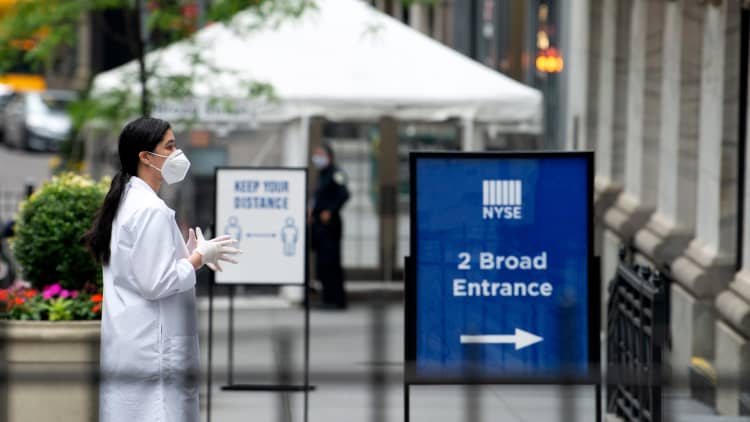
Stocks are sending mixed signals.
The Dow Jones Industrial Average slid for a second straight trading session on Thursday as Wall Street monitored rising coronavirus cases domestically and abroad. Worse-than-expected jobless claims data also kept a lid on gains.
The Nasdaq Composite was the day's bright spot, locking in its fifth straight gain.
Market watchers are grappling with the question on everyone's mind: How quickly will the economy recover?
Here's what three of them said Thursday:
Rate of recovery
Mark Vitner, senior economist at Wells Fargo Securities, said the speed of the comeback could be slowing:
"I really think that what we're seeing is a slowdown in the rate of improvement. And we saw an initial bounce back, and when you saw activity fall as hard as it did in April and you go from being 100% of restaurants closed to 85% of restaurants being closed, that gets you a big callback of workers. But the improvement from there seems to be slowing because I've been to a number of restaurants recently and some do it very well in terms of being able to socially distance. If they're able to seat people outdoors they can do it fairly well, but others just have very limited capacity. And so, I think that maybe the easiest reopenings are now behind us and it's going to be a little bit tougher to get large incremental gains going forward."
Dramatic dispersions
Joseph Amato, chief investment officer at Neuberger Berman, warned investors not to get ahead of themselves:
"I think the market's been remarkably resilient, particularly the larger-cap quality names that have come back dramatically since the lows back a number of months ago, and that does reflect the sense that we bottomed out from an economic standpoint and the data is going to start to get better and markets typically focus on ... the rate of change going forward. But it's been a pretty remarkable bounce back. At the same time, if you look at the dispersion between large-cap U.S. versus other parts of the world or versus even small cap in the U.S., it's still quite a dramatic dispersion. If you look at the Russell 2000 Value [Index, it] is down 20%-25% so far this year whereas the S&P … is only down modestly. As it relates to the economic pickup, what we're trying to balance is the speed of the reopening has gotten folks very enthusiastic, but we don't want to mistake the speed of the reopening with the strength of the recovery. I think we're focused on the strength of the recovery as what will determine, ultimately, the fundamental values of equity markets."
Tech's relative strength
Mark May, a managing director in Stifel's global technology group, spoke to the Nasdaq's relative strength:
"As it relates to valuations, with the rebound in the stocks over the last couple of months, we've also seen, obviously, the multiples move up as well. And we're now looking, for the broader tech sector, [at] forward multiples that are at or near the high end of the recent historical range. I think the one thing, though, to point out is that a lot of the analysts have revised their estimates down over the last couple of months, and what we've seen, especially in Q1 earnings season and some of the commentary more recently, is it looks like a lot of the tech companies are actually performing a bit better. And so, what we're seeing is while the reported multiples might look at the high end of the historical range, investors essentially expect there to be upside to the recently revised-down forecasts. So, yeah, multiples are getting up there, but probably a bit lower than what they look like on paper."






